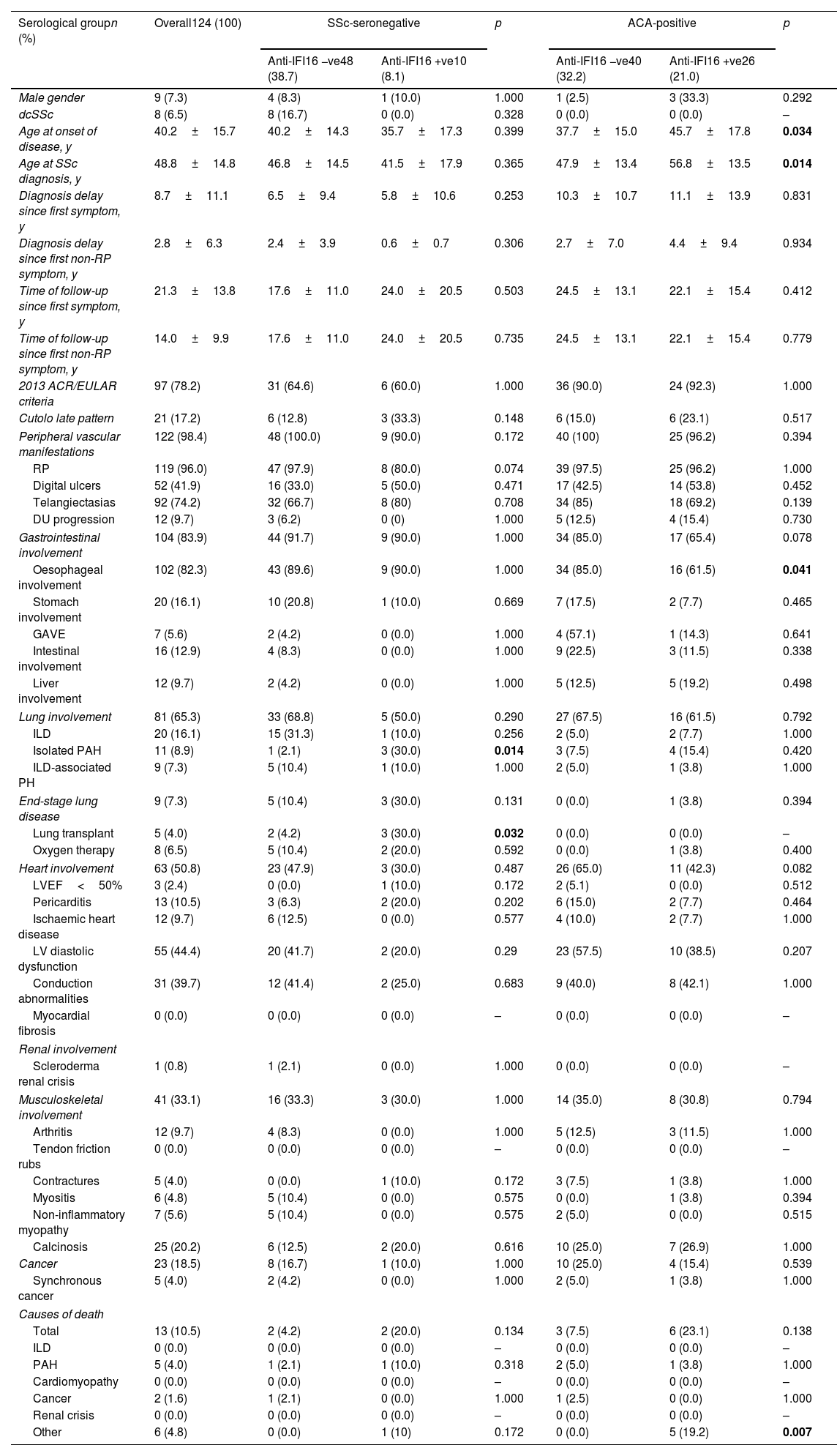To determine the diagnostic value of anti-interferon gamma inducible protein 16 (IFI16) autoantibodies in systemic sclerosis (SSc) patients negative for all tested SSc-specific autoantibodies (SSc-seronegative patients) and to evaluate the clinical significance of these autoantibodies, whether isolated or in the presence of anti-centromere autoantibodies (ACA).
MethodsOverall, 58 SSc-seronegative and 66 ACA-positive patients were included in the study. All patients were tested for anti-IFI16 autoantibodies by an in-house direct ELISA. Associations between clinical parameters and anti-IFI16 autoantibodies were analysed.
ResultsOverall, 17.2% of SSc-seronegative and 39.4% of ACA-positive patients were positive for anti-IFI16 autoantibodies. Anti-IFI16 autoantibodies were found only in patients within the limited cutaneous SSc (lcSSc) subset. A positive association between anti-IFI16 positivity and isolated pulmonary arterial hypertension (PAH) was found (odds ratio [OR]=5.07; p=0.014) even after adjusting for ACA status (OR=4.99; p=0.019). Anti-IFI16-positive patients were found to have poorer overall survival than negative patients (p=0.032). Cumulative survival rates at 10, 20 and 30 years were 96.9%, 92.5% and 68.7% for anti-IFI16-positive patients vs. 98.8%, 97.0% and 90.3% for anti-IFI16-negative-patients, respectively. Anti-IFI16-positive patients also had worse overall survival than anti-IFI16-negative patients after adjusting for ACA status in the multivariate Cox analysis (hazard ratio [HR]=3.21; p=0.043).
ConclusionAnti-IFI16 autoantibodies were associated with isolated PAH and poorer overall survival. Anti-IFI16 autoantibodies could be used as a supplementary marker of lcSSc in SSc-seronegative patients and for identifying ACA-positive patients with worse clinical outcome.
Determinar el valor diagnóstico de los autoanticuerpos anti-interferon gamma inducible protein 16 (IFI16) en los pacientes con esclerodermia sistémica (SSc) negativos para todos los autoanticuerpos específicos de SSc (pacientes SSc seronegativos) y evaluar el significado clínico de estos autoanticuerpos, aislados o en combinación con autoanticuerpos anticentrómero (ACA).
MétodosSe incluyeron 58 pacientes SSc seronegativos y 66 pacientes ACA positivos. Todos los pacientes se testaron para los autoanticuerpos anti-IFI16 mediante un ELISA directo «in-house». Las asociaciones entre parámetros clínicos y los autoanticuerpos anti-IFI16 fueron analizadas.
ResultadosEn total, el 17,2% de los pacientes SSc seronegativos y el 39,4% de los pacientes ACA positivos fueron positivos para anti-IFI16. Los autoanticuerpos anti-IFI16 se detectaron solamente en los pacientes con la forma limitada cutánea de SSc (lcSSc). Se encontró una asociación entre la positividad de anti-IFI16 y la hipertensión arterial pulmonar (HAP) aislada (odds ratio [OR]: 5,07; p=0,014), incluso cuando se ajustó el análisis a la presencia o ausencia de ACA (OR: 4,99; p=0,019). Los pacientes anti-IFI16 positivos mostraron una peor supervivencia general que los pacientes negativos (p=0,032). Las ratios de supervivencia acumulada a 10, 20 y 30 años fueron respectivamente del 96,9, 92,5 y 68,7% para los pacientes anti-IFI16 positivos frente al 98,8, 97,0 y 90,3% para los anti-IFI16 negativos. Los pacientes anti-IFI16 positivos también tenían una supervivencia general menor que los pacientes anti-IFI16 negativos tras ajustar para la presencia o ausencia de ACA mediante análisis multivariado de Cox (hazard ratio [HR]: 3,21; p=0,043).
ConclusiónLos autoanticuerpos anti-IFI16 se asocian con HAP aislada y una peor supervivencia general. Los autoanticuerpos anti-IFI16 se podrían emplear como marcador suplementario de lcSSc en pacientes SSc seronegativos y para identificar pacientes ACA positivos con un peor pronóstico.
Artículo
Comprando el artículo el PDF del mismo podrá ser descargado
Precio 19,34 €
Comprar ahora












